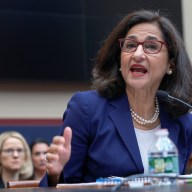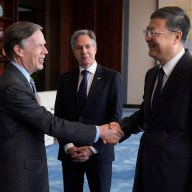KANDAHAR, Afghanistan – Afghan police officers in blue uniforms rush from their green Toyota pickup truck and take position kneeling on the ground, braced for an onslaught with their blue plastic AK-47s at the ready.
In a shooting range not far away, another group of officers has traded the plastic weapons for the real thing and are taking aim at paper targets.
They do this under the watchful eyes of Canadian military and civilian police trainers, who have taken on the rather big job of basic training for the Afghan police, notorious for their corruption, violence and lack of discipline.
In a little more than a week, these officers will be the first line of defence for Afghanistan’s presidential and provincial council elections, responsible for securing polling stations throughout the war-torn country.
“It’s the most dangerous job in the world,” said Sgt. Clement Brunelle, an RCMP officer from Montreal who is among the 19 Canadian military and civilian police who have taken on training their Afghan counterparts at this school on a U.S. military base in Kandahar.
It’s sometimes a frustrating exercise, admits Supt. John White, commander of the training centre, but he said it’s a worthwhile one.
“We hope that what we teach them will perhaps save some of their lives,” said White, of Almont, Ont., and a member of the Mounties International Peacekeeping Branch.
The Aug. 20 vote is only the second election ever held in Afghanistan – the first to be led by Afghans themselves – and the stakes are high. Whether or not it will be a free and fair election remains to be seen.
The vote will take place in the worst security situation in Afghanistan since the Taliban was toppled in 2001. There has been an influx of U.S. troops and an increase in clashes between insurgents and pro-government forces.
Insurgents have vowed to disrupt the polls and have increased attacks in the past two months – including a rocket attack on the capital city of Kabul and the assassinations of at least four political candidates or their staff.
The Taliban desperately needs to bolster their rag-tag alliance, while NATO and U.S. officials have admitted they desperately need signs of progress for the war-weary public back home.
And on the front line on this historic day will be the fledgling Afghan National Police.
After the 2005 parliamentary elections, the observer group Free and Fair Elections for Afghanistan issued a report looking at the campaign and polling process. The group had several specific recommendations concerning police.
“Police and security forces responsible for the safe-keeping of voters, candidates and the electoral process at large should not turn into a source of insecurity and intimidation,” said the report.
The group’s observers did say that in the majority of cases, police acted properly but in some cases they were a hindrance.
“Some police officers were not wearing police uniforms and, in some cases, intimidated voters to vote for a specific candidate,” the report said.
On May 31, the United Nations launched election-specific training for 350 officers, who were then to become trainers for their colleagues. In this way, the world agency hoped to have 35,000 police officers trained to provide security at polling stations on election day.
They printed thousands of election brochures for the predominantly illiterate ranks of the Afghan police, although an official said the substantive training was designed to be passed on from officer to officer without need of the brochures.
The training the police are getting at the hands of the Canadian military and civilian police, along with three Afghans and military and civilian police from the United Kingdom, is not election-related.
But human rights, Afghan history and bribery are among the courses on offer, in addition to courses in handling weapons, survival drills and law.
Corruption is a persistent and deeply-rooted problem with the Afghan police ranks. For officers who haven’t always gotten paid, bribes are sometimes their daily bread, and some police commanders have quotas for their officers and end up with the largest share of the graft.
But White, a 35-year RCMP veteran who’s trained police officers in Haiti and Kosovo, among others, said that despite the challenges, setbacks and the “endemic” corruption, the Afghan officers are keen to learn.
“They know that these things will save their lives so they’re very enthusiastic,” he said.
The recruitment targets for both Kandahar province and for Afghanistan as a whole have fallen short. In June, a United Nations report found that the force had grown to about 79,000 officers – nearing the 82,000 goal – but that the number of “adequately trained” officer was low, and corruption and absenteeism persist.
The next day, the Canadian government announced an additional $12 million to boost the number of Afghan police officers, on top of the $99 million Canada had already committed over three years to training, mentoring and equipping the Afghan police. The new money was to pay salaries for 1,000 more Afghan officers in Kandahar province.
Of the 292 police officers who began the training with Canadians seven weeks ago, 44 have been dismissed for failing drug tests or bad behaviour. The 248 who remain graduate this week.
Some are 10-year veterans receiving training for the first time. Others are rookies, drawn by the promise of a paycheque, or the possibility of learning to read and write.
Haji Jaillat Khan, commander of the Afghan police in training, said the training is good but what his officers need is experience.
As far as next week’s election, he’s confident – mostly.
“Inshallah,” he said of whether the elections will take place unhindered by Taliban threats. God willing.
“Maybe something will happen, but we train our police better,” he said through a translator.
















